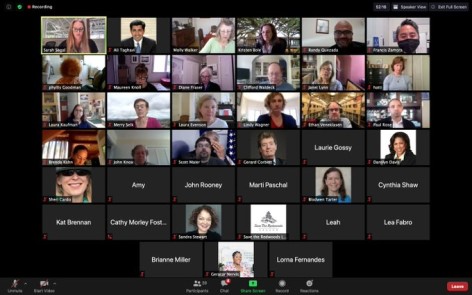“2020 was to have been a banner year for San Francisco and the cruise business. Instead, we got coronavirus.”
That’s how Randy Quezada put it when looking back over the past few months of his job as communications director at the Port of San Francisco.
 Quezada was a panelist at a discussion about managing communications during a pandemic, at the San Francisco Public Relations Round Table virtual meeting on June 30. Other panelists were Kristen Bole, director of clinical communications at UCSF Health, and Francis Zamora, director of external affairs for the San Francisco department of emergency management.
Quezada was a panelist at a discussion about managing communications during a pandemic, at the San Francisco Public Relations Round Table virtual meeting on June 30. Other panelists were Kristen Bole, director of clinical communications at UCSF Health, and Francis Zamora, director of external affairs for the San Francisco department of emergency management.
All three speakers talked about their focus on accuracy and timeliness in getting information to the media during the coronavirus pandemic. That included updating and correcting information in real time, since the data and knowledge base was (and is) in constant flux. “By day 3, the information we provided on day 1 may have changed,” said Quezada. “It is crucial that we maintain transparency because people are afraid.”
 “Added to the need for accuracy was our need to protect patient privacy,” said Kristen Bole. “UCSF is a leader in infectious disease, and we were getting calls from media around the world. They all wanted to know not only if we had any COVID-19 patients, but who they were if we did.” This was an especially delicate situation since there was so much xenophobia and stigma swirling around the issue of where the virus originated.
“Added to the need for accuracy was our need to protect patient privacy,” said Kristen Bole. “UCSF is a leader in infectious disease, and we were getting calls from media around the world. They all wanted to know not only if we had any COVID-19 patients, but who they were if we did.” This was an especially delicate situation since there was so much xenophobia and stigma swirling around the issue of where the virus originated.
According to Bole, “Every news organization had staffed up to handle this crisis. The San Francisco Chronicle alone had added 10 reporters to cover the pandemic. We have three staff people who were handling calls on a subject that changed hourly.” The UCSF website had 100,000 page-views on one day in mid-February; at one point, it was trending higher than the US Centers for Disease Control and Prevention’s website.
 Francis Zamora noted that the city’s emergency management department had been training for handling a crisis of this magnitude for a long time. But the crisis they were training for was an earthquake, not a pandemic. In addition to the objective of providing accurate information about the pandemic, Zamora had to answer questions about what the city was doing to protect people who had no housing. “Randy (Quezada) and I partnered on many of these issues, which in some way are more complicated now than they were at the start of the pandemic.”
Francis Zamora noted that the city’s emergency management department had been training for handling a crisis of this magnitude for a long time. But the crisis they were training for was an earthquake, not a pandemic. In addition to the objective of providing accurate information about the pandemic, Zamora had to answer questions about what the city was doing to protect people who had no housing. “Randy (Quezada) and I partnered on many of these issues, which in some way are more complicated now than they were at the start of the pandemic.”
In all the city’s outreach and educational programs, Zamora stressed that living with a pandemic entails behavior changes. “We’re asking people to learn to do things differently now, and that takes time.”
The three speakers all mentioned the importance of following these public relations basics as the key to their ongoing coronavirus communications:
- Establish relationships with reporters so they know they can trust you.
- Help reporters get the best story they can.
- Correct your factual errors as soon as you find out you’ve made them. This furthers your credibility with reporters.
- Reach out to community groups to partner with you on issues. (“Plan with your community, not for them,” says Zamora.) These include neighborhood organizations, faith-based groups and the private sector.
“Life as we knew it before COVID-19 is going to be a whole lot different. Influencing that, and making sure we have a sustained effort to change people’s behaviors, is part of our long-term recovery.” –Francis Zamora, San Francisco Department of Emergency Management
The panel was moderated by Sarah Segal, SF PRRT board member, and founder and owner of Segal Communications. Watch the recorded meeting below.
By Phyllis L. Goodman, Board Member

